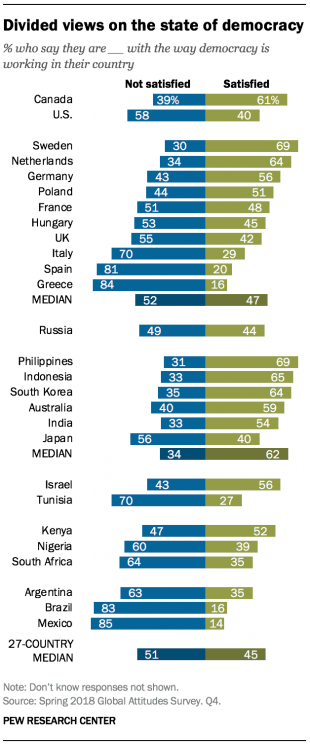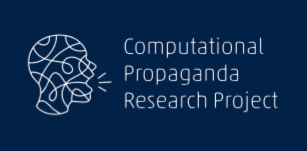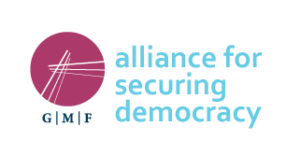As voters prepare to elect a new European Parliament, Europeans feel disaffected with the performance of democracy in their countries. In six of the 10 European countries surveyed, half or more say they are dissatisfied with how democracy is working in their nation, the Pew Research Center’s Kat Devlin writes:
Across 10 surveyed EU countries, a median of 62% see the EU favorably, compared with a median of 50% who see the European Parliament favorably. The UK and Greece stand out for their negative assessments of both. In two of the EU’s biggest countries – France and Germany – majorities have a favorable view of the EU, but views of the European Parliament are divided.
Polling suggests that issues like corruption, unemployment, and inequality are at least equally important to many Europeans as migration, according to Brookings analysts Sam Denney and Kemal Kirişci.
“By hardening Europe’s borders while not pursuing structural economic reform, the European mainstream has tried to co-opt the populists’ key issue—security—while avoiding the difficult political compromises required to stave off the next economic crisis,” they add. “In so doing, they may have inadvertently aided the populists in accomplishing their goal of limiting immigration and pushing back on diversity.”
In the face of a populist upsurge, French President Emmanuel Macron has called for a “European Agency to Protect Democracy,” The New York Times adds.
Racially divisive rhetoric and misinformation in the form of online news articles has flourished ahead of the upcoming European Parliament elections, according to a new study released Tuesday from researchers at the University of Oxford, NBC News reports:
The findings are an ominous sign for politicians concerned about the rise of far-right and nationalist groups that are predicted to gain new seats in the elections Thursday through Sunday. Their views can get a wider boost through sharing by sympathizers, aided by automation and foreigner influencers.
 “Policy-makers have raised concerns about the potential risk of disruption of and tampering with the forthcoming European elections,” wrote Nahema Marchal, Bence Kollanyi, Lisa-Maria Neudert and Philip N. Howard, the researchers at the Oxford Internet Institute (OII). “In Europe, there is widespread concern that coordinated misinformation campaigns and computational propaganda are undermining the integrity of political processes.”
“Policy-makers have raised concerns about the potential risk of disruption of and tampering with the forthcoming European elections,” wrote Nahema Marchal, Bence Kollanyi, Lisa-Maria Neudert and Philip N. Howard, the researchers at the Oxford Internet Institute (OII). “In Europe, there is widespread concern that coordinated misinformation campaigns and computational propaganda are undermining the integrity of political processes.”
Individual stories shared on Facebook’s platform can still hugely outperform the most important professionally produced news stories, drawing as much as four times the volume of Facebook shares, likes, and comments, notes the study, conducted for OII’s Computational Propaganda Project. The main findings are:
-

Computational Propaganda
Less than 4% of sources circulating on Twitter during our data collection period were junk news or known Russian sources, with users sharing far more links to mainstream news outlets overall (34%), except in the Polish sphere, where junk news made up 21% of traffic.
- On Facebook, while many more users interact with mainstream content overall, individual junk news stories can still hugely outperform even the best, most important professionally produced stories, drawing as much as four times the volume of shares, likes, and comments.
- The most successful junk news stories in our data set tend to revolve around populist themes such as anti-immigration and Islamophobic sentiment, with few expressing Euroscepticism or directly mentioning European leaders or parties.
 The European poll could prefigure challenges facing future elections in other democracies, observers suggest.
The European poll could prefigure challenges facing future elections in other democracies, observers suggest.
“The E.U. parliamentary elections can potentially be viewed as a bellwether for broader, transatlantic political trends,” said Bret Shafer, social media analyst for the Alliance for Securing Democracy.
“If we want to be better prepared for 2020 than we were for 2016, we need to be playing close attention to elections the world-over, particularly ones that may be of strategic interest to our adversaries,” he added.







